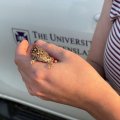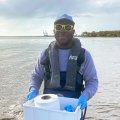
Immunising people with vaccines that are quick and inexpensive to produce is the answer to preventing large-scale spread of infectious disease, Professor Anton Middelberg from UQ’s Australian Institute for Bioengineering and Nanotechnology says.
Using modern molecular and bioprocessing tools, Professor Middelberg and his team are developing vaccines that can be changed and manufactured for the entire Australian population within days of a new virus appearing.
“The new vaccines we are developing are also much cheaper to mass-produce than traditional technologies, so are relevant where cost is an issue – for example, in the developing world,” Professor Middelberg said.
“We use biotechnology to create the safe parts of a virus, and then we use nanotechnology to assemble these building blocks into a virus-like particle (VLP) in a reactor.
“VLPs resemble viruses but, as they only use the safe part of the virus, they are not infectious.
“However, being a safe mimic of the dangerous virus, they raise an excellent immune response.
“Biotechnology allows us to make VLPs rapidly using bacteria, and the VLPs can be manipulated within reactors (not cells) to change composition and target the new disease-causing agent.
“This enables an incredibly fast response to new threats.”
Professor Middelberg said vaccines needed to be affordable.
“They need to be quickly mass produced once we identify a mutated or new virus – and certainly before it causes widespread disease,” he said.
Current influenza vaccines are made using egg-based technologies first developed in the 1930s.
“If we are surprised by a sudden change, as with swine flu in 2009, people die while they wait for the vaccine composition to ‘catch up’ with the new virus,”
Professor Middelberg said.
“This issue of speed is also critical for other new and emerging viruses that may invade from overseas, or even locally.
“We simply can’t make vaccines fast enough.
“Such radical re-engineering of the system we use to make and deliver new vaccines will have a huge impact on how we can prevent disease, particularly in developing countries, and will bolster another old saying, ‘prevention is better than cure’.”
Media: Professor Middelberg (07 3346 4189, a.middelberg@uq.edu.au), AIBN Marketing and Communications Manager Erik de Wit (07 3346 3962, e.dewit@uq.edu.au) or Penny Robinson at UQ Communications (07 3365 9723, penny.robinson@uq.edu.au)












